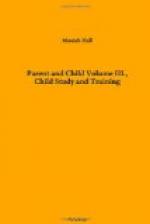6. Discuss proper dress in children.
For further help on these points read Mrs. Harrison’s
“Study of Child
Nature,” pages 47 to 54.
CULTIVATING THE EMOTIONS
It Is a Serious Mistake to Begin Educating the Intellect Before Training the Emotions
In the history of the race, art develops before science, just as in nature the blossom comes before the fruit; so in the child emotions come before reason, and he is attracted and his sympathies aroused by nearly any appeal to his senses long before his understanding tells him why. Notwithstanding this fact, nearly every educative effort is confined to the intellect and the feelings are allowed to shift for themselves. The result is that many a child grows up cold, hard, and matter-of-fact, with little of color, poetry or sympathy to enrich his life. The common mistake is to starve the emotions in order to overfeed the understanding. The education of the heart must keep pace with that of the head if a well-balanced character is to be developed. Even in school the teacher too often proceeds to stuff the child with information before first awakening interest in the subject. Once arouse the interest of a child in any subject and he will pursue it to success.
Toys are of much value to children not only as promoters of play but because they appeal to their sympathies and give exercise to the emotions. The two great obstacles to the exercise of the right emotions are fear and pity. Toys are great aids in overcoming these tendencies. Through dramatic play with toys, children exercise their own imaginations and put action into their own lives; and gradually fear and pity are overcome through the confidence the child develops in himself.
“We find the instincts of the race renewed in each new-born infant. Each individual child desires to master his surroundings. He cannot yet drive a real horse and wagon, but his very soul delights in the three-inch horse and the gaily-painted wagon; he cannot tame real tigers and lions, but his eyes dance with pleasure as he places and replaces the animals of his toy menagerie. He cannot at present run engines or direct railways, but he can control for a whole half-hour the movements of his miniature train. He is not yet ready for real fatherhood, but he can pet and play with, and rock to sleep and tenderly guard the doll baby.” Through toys the child practises in miniature most of the activities of the adult and thus gradually bridges the chasm between his small capacity and the great realities and possibilities of life.
The heart should be trained as carefully as the head. Our emotions even more than our reason govern us. Train the child to feel rightly, to admire the good, the true and the beautiful, and you need not fear. He will develop a love of home, of country and of God that will carry him safely throughout all his life. This does not mean that we shall neglect the training of his intellect; both heart and head should be trained together, but the heart must not be neglected; for out of it, says the Good Book, come the issues of life.




